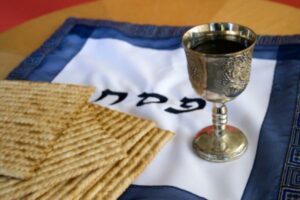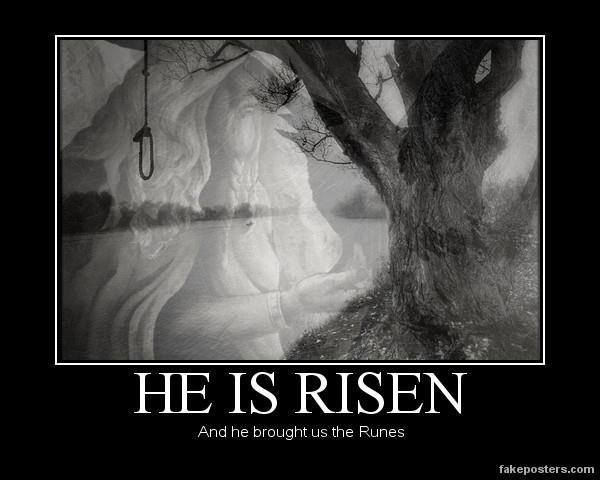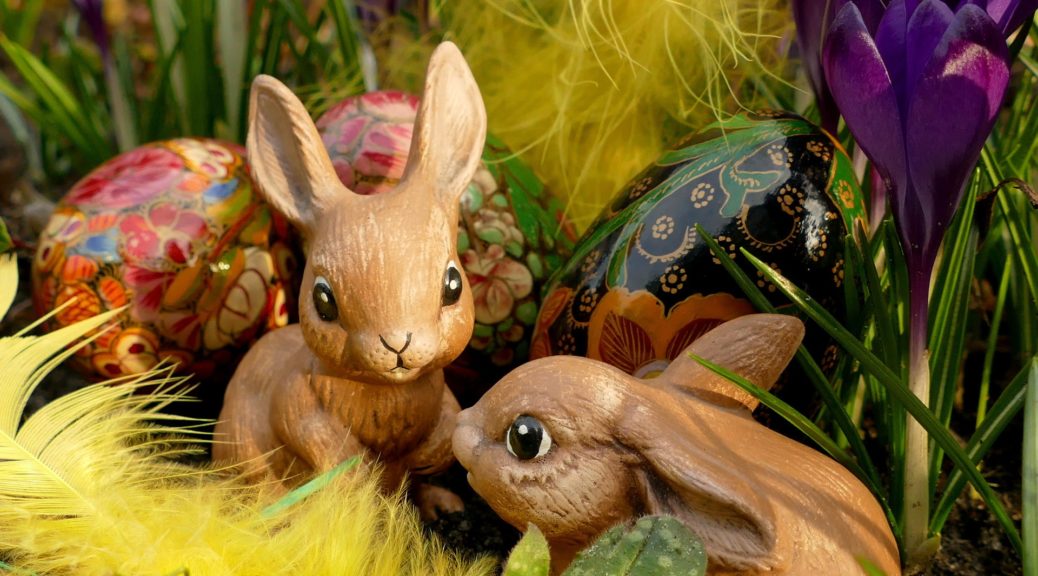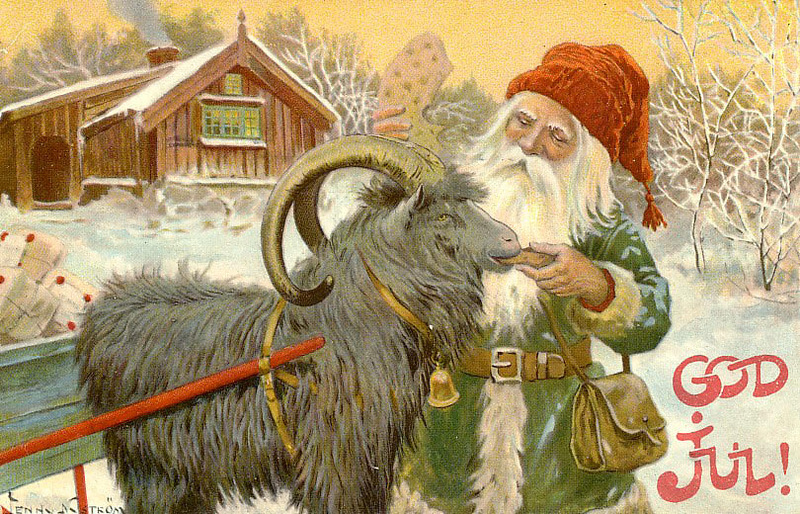Let’s Talk Easter…Or Should I Say Eostre?
 All right, buckle up, fellow pagans and Heathens, because it’s time to talk about the elephant in the room: Easter. You know, that holiday where Christians celebrate the resurrection of their lord and savior Jesus Christ by painting eggs, eating chocolate bunnies, and hiding baskets of treats for their kids? Yeah, that one.
All right, buckle up, fellow pagans and Heathens, because it’s time to talk about the elephant in the room: Easter. You know, that holiday where Christians celebrate the resurrection of their lord and savior Jesus Christ by painting eggs, eating chocolate bunnies, and hiding baskets of treats for their kids? Yeah, that one.Now, I’m not saying that there’s anything inherently wrong with Christians celebrating their holiday in whatever way they choose. But let’s not forget where all these trappings of Easter actually came from. That’s right, folks, they’re all stolen from pagan beliefs and customs that predate Christianity by centuries, if not millennia.
Etymology of Easter
 Let’s start with the name itself: Easter. You might be surprised to learn that it’s actually named after a pagan goddess, Eostre (or Ostara), who was worshipped by the Germanic peoples of Europe. She was associated with the spring equinox, fertility, and new beginnings – which makes sense, considering that spring is the time when the world wakes up from its winter slumber and everything starts to bloom and grow again.
Let’s start with the name itself: Easter. You might be surprised to learn that it’s actually named after a pagan goddess, Eostre (or Ostara), who was worshipped by the Germanic peoples of Europe. She was associated with the spring equinox, fertility, and new beginnings – which makes sense, considering that spring is the time when the world wakes up from its winter slumber and everything starts to bloom and grow again.
But when Christianity came along, it wasn’t content to let the pagans have their fun. So, it appropriated the name of Eostre’s festival and turned it into its own holiday. That’s right, Christians couldn’t even come up with their own name for this holiday – they had to steal it from a pagan deity.
Easter and Passover

And let’s not forget that Easter is also tied to the Jewish holiday of Passover. Passover celebrates the Israelites’ liberation from slavery in Egypt. It’s no coincidence that Jesus’s resurrection was said to have happened around the same time as Passover. The early Christians were trying to piggyback off the popularity of an already-established holiday. And it’s not just the name and holiday that was appropriated. Many of the symbols associated with Easter have pagan roots as well.
Easter Eggs
 But let’s move on to some of the more tangible trappings of Easter. Eggs, for example. The egg is a potent symbol of fertility and new life in many cultures. Eggs have been used in springtime celebrations for thousands of years.
But let’s move on to some of the more tangible trappings of Easter. Eggs, for example. The egg is a potent symbol of fertility and new life in many cultures. Eggs have been used in springtime celebrations for thousands of years.
The ancient Persians used to decorate eggs for their New Year celebrations. And the ancient Egyptians and Greeks used them as offerings to their gods. This has nothing to do with Jesus rising from the dead, and everything to do with pagan fertility symbolism. Eggs have long been associated with new life and rebirth, and were often used in pagan spring rituals.
Easter Bunny
 Let’s now look at the Easter bunny. This fluffy little creature has nothing to do with the resurrection of Jesus Christ, but everything to do with the pagan celebration of spring. In Germanic folklore, the hare was associated with the goddess Ēostre, and was seen as a symbol of fertility and new life. The tradition of the Easter bunny laying eggs (yes, you read that right) is thought to have originated in Germany, where children would make nests for the hare to lay its eggs in.
Let’s now look at the Easter bunny. This fluffy little creature has nothing to do with the resurrection of Jesus Christ, but everything to do with the pagan celebration of spring. In Germanic folklore, the hare was associated with the goddess Ēostre, and was seen as a symbol of fertility and new life. The tradition of the Easter bunny laying eggs (yes, you read that right) is thought to have originated in Germany, where children would make nests for the hare to lay its eggs in.
The early Christians, of course, weren’t content to let the pagans have their bunny fun – so they co-opted it as a symbol of Jesus’s resurrection. Because nothing says “He is risen” like a cute, fluffy bunny delivering candy to children.
Candy and Easter

And speaking of candy, let’s not forget about all the sweet treats that have become synonymous with Easter. Chocolate eggs, marshmallow chicks, jelly beans – these are all modern inventions, but they all have their roots in the pagan tradition of offering sweet treats to the gods as a way of ensuring a bountiful harvest. The early Christians, again, saw no problem with appropriating this tradition and turning it into a way to celebrate Jesus’s resurrection.
Timing of Easter
But it’s not just the symbols of Easter that have pagan origins – the timing of the holiday itself is suspect as well. The Christian celebration of Easter always falls on the Sunday after the first full moon following the vernal equinox. If you recall your science, the vernal equinox is when day and night are equal in length. This may sound like a purely astronomical calculation, but in fact it has its roots in pagan beliefs. The vernal equinox was a time of great importance in many pagan cultures. Pagans often associated it with the return of the sun or the god of spring.
Now, I know what some of you might be thinking. “But Tyra, isn’t it possible that some of these traditions just developed independently in different cultures?” Sure, it’s possible. But when you look at the overwhelming evidence of how Christianity has appropriated and co-opted pagan beliefs and customs over the centuries, it’s hard to ignore the pattern.
The TL;DR
So, what’s the takeaway here? Well, for one thing, it’s important to remember that the trappings of Easter – the eggs, the bunny, the candy – all have deep roots in pagan traditions. And while there’s nothing inherently wrong with Christians celebrating their holiday in this way, it’s worth acknowledging where these traditions actually come from.
So there you have it, folks. Christianity has once again appropriated our ancestral traditions and claimed it as its own. So, when you chow down on that chocolate bunny this spring, give thanks to Eostre and the gods and goddesses of Spring.
—
Did you know you can become my patron for as little as $5 a month? This entitles you to content not posted anywhere else. Plus you get to see posts like this three days before the public! Without patrons, I’d be having a very hard time keeping this blog going. Become a patron today!Become a Patron!



 Every year about this time, Heathens, pagans, and those who don’t celebrate the Christian holiday of Easter are quick to point out that Easter isn’t a Christian holiday; yours truly included. But I do wish to address Easter as a Christian holiday, even if it has taken its name and customs from pagan celebrations.
Every year about this time, Heathens, pagans, and those who don’t celebrate the Christian holiday of Easter are quick to point out that Easter isn’t a Christian holiday; yours truly included. But I do wish to address Easter as a Christian holiday, even if it has taken its name and customs from pagan celebrations. Now, before we go into all the pagan traditions surrounding Easter, I’m going to point out that despite my dislike of Christianity and its destruction of paganism, pagans can only superficially claim Easter because it is around the Vernal Equinox. The whole fairy tale of the “purportedly magic Jew” rising from the dead after being crucified is more or less their shtick. It happens around the time of Passover, which is based on the Book of Exodus in the Bible.
Now, before we go into all the pagan traditions surrounding Easter, I’m going to point out that despite my dislike of Christianity and its destruction of paganism, pagans can only superficially claim Easter because it is around the Vernal Equinox. The whole fairy tale of the “purportedly magic Jew” rising from the dead after being crucified is more or less their shtick. It happens around the time of Passover, which is based on the Book of Exodus in the Bible. are ingrained in our psyches. But it is a Christian story. Why? Because it doesn’t quite mimic any other pagan myth out there.
are ingrained in our psyches. But it is a Christian story. Why? Because it doesn’t quite mimic any other pagan myth out there. Sure, Easter took on the pagan trappings of Eostre/Ostara. No bunnies were visiting Christ on the cross, as far as we know. And while eggs are purported to be the symbol of rebirth among the Jewish peoples, I haven’t done enough research into that to back that up. But you can read about my opinions,
Sure, Easter took on the pagan trappings of Eostre/Ostara. No bunnies were visiting Christ on the cross, as far as we know. And while eggs are purported to be the symbol of rebirth among the Jewish peoples, I haven’t done enough research into that to back that up. But you can read about my opinions, 




 Go Have Fun While the Christians are in Church
Go Have Fun While the Christians are in Church









